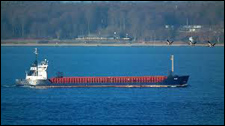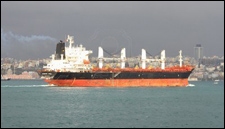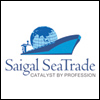
 — Sushil Saigal, Executive Director, and Deepak Saigal, Executive Director, Saigal Sea Trade (P) Ltd
— Sushil Saigal, Executive Director, and Deepak Saigal, Executive Director, Saigal Sea Trade (P) Ltd
Since its establishment in 1988, Saigal SeaTrade Pvt. Ltd of Mumbai has played an active role in providing key supply chain logistical support for industries in India. The company specialises in dry bulk cargo like coal and iron ore for growing steel industries and thermal power plants across the country. Sushil Saigal and Deepak Saigal discuss the growth in import of coal and its impact on coal-fired power plants in India.
To begin with, can you share your outlook on dry cargo, especially coal, in the Indian shipping sector?
India’s coal import is expected to reach 140 million tonnes in 2013, of which 90 million tonnes of coal will be imported from Indonesia. It is anticipated that India will soon overtake Japan as the biggest buyer of Indonesian coal. Rapid growth of Indian coal-fired power plants and steel industries will further increase the domestic supply and demand gap to about 230 million tonnes by 2017.
What are th e major growth drivers in the dry cargo (coal) shipping sector?
e major growth drivers in the dry cargo (coal) shipping sector?
One of the major growth drives in the dry cargo market is China’s energy strategy for the future. The Chinese are reviewing their coal supply strategy to address the mismatch in demand-supply between West and East China by reducing high cost inland rail and coastal sea transport, by increasing coal imports into East China to meet demand growth. The Chinese Energy Institute, based on their assumption that South-East China coastal region accounts for about 23 per cent of total Chinese demand, have observed that coal consumption of the region will increase to about 880 million tonnes by 2015 and incremental demand (i.e. the volume of coal import) will be about 300 million tonnes. Assuming that the coal imports of South-East China coastal region (i.e. 300 million tonnes) is about 70 per cent of total, it is expected that China will altogether import about 430 million tonnes by 2015, about 11.3 per cent of China’s total coal consumption.
The perception on forthcoming grain season in South America is for a record crop in soyabean. Total exports increased by 20 per cent from 77 million tonnes in 2008-2009 to 93 million tonnes in 2009-2010 and will continue to grow strongly. Once again increased demand from China will be the main catalyst of increased export volumes, thus driving up tonne-miles.
While it is relatively straightforward to estimate the supply of ships, it is more difficult to assess the global demand, as the game changer is the change in trading patterns and, more specifically, resultant increase in tonne-miles and port congestion, which absorbs available ships.
What are the bottlenecks in coal imports? How can we overcome these problems?
Due to the recent economic slowdown, there has been lack of sustained investments in new infrastructure projects (railways, port, bridges etc.). Specifically, growth of Indian ports has been slow as privatisation plans are encountering numerous roadblocks and suffering setbacks. With the recent hike in diesel prices, inland road haulage and logistics costs have increased. However, ongoing plans to develop adequate infrastructure at Indian ports and railways will assist in handling the increased demand of imported coal.
What is your view on Indian ports?
Ports are able to handle additional traffic, but there is slow evacuation of cargo and poor hinterland connectivity so larger vessels may not necessarily be the most feasible option. The monopoly of Indian Railways has further restricted ports from installing wagon-handling systems and limited the number of wagons per train, impacting inland haulage of imported coal.
Tell us about the services provided by Saigal SeaTrade.
As ship brokers, we leverage our in-depth knowledge of market trends, freight earnings, vessel valuation, route selection and other related areas to ensure the best possible outcome for both commercial chartering and ship operations. Our dry cargo team of brokers is dedicated solely to providing cost-effective long-term freight solutions to upcoming steel industries and thermal power plants.
 Does Saigal SeaTrade have specific plans for the next five years?
Does Saigal SeaTrade have specific plans for the next five years?
We have close to 25 years of professional experience and skills. We have been closely associated with internationally reputed shipowners and charters. Today, we aim to have a global market presence, for which we plan to acquire an overseas shipbroking firm.
Although your company mostly handles coal imports, did the iron ore mining ban affect your business?
We are also involved in export of iron ore. Indian steelmakers have not been able to get the benefits of softening iron ore prices in the international market mainly due to the scarcity caused by the mining ban. Under the new pricing mechanism, domestic demand-supply situation and grade of iron ore, instead of export parity, determine the domestic price of iron ore. We expect that export of iron ore from India to drift down to about 30-35 million tonnes in 2013.











